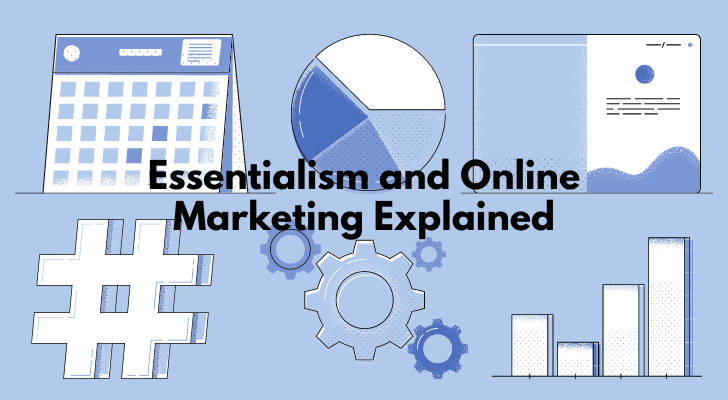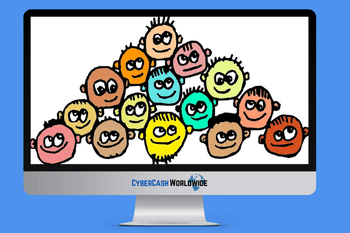Essentialism is a popular concept in online marketing. It’s a philosophy that suggests you should focus on what matters most and eliminate the rest. It’s also a way to simplify complex topics. But what exactly is essentialism and how can it be applied to online marketing? It's important to understand the concept of essentialism and how it can be applied to strategies. Essentially, essentialism is the idea that there are certain core principles or elements that are necessary for a thing to be what it is. In other words, it's about finding the essence of something.
What is Essentialism?
Essentialism is the philosophy that less is more. The idea is that by focusing on only the essentials, we can achieve greater clarity and purpose in our lives. This philosophy can be applied to many areas of life, including online marketing.
When it comes to online marketing, essentialism means focusing on only the most important elements of your marketing strategy. This could include creating highly targeted ad campaigns, developing a strong brand identity, and creating valuable content that speaks to your target audience. By simplifying your marketing efforts, you can create a more effective and efficient online marketing strategy.
How do Essentialism and Online Marketing Work Together?
In a world where we are constantly inundated with choices and distractions, it can be difficult to focus on what is truly important. Essentialism is a philosophy that helps individuals to identify and focus on the things that are most essential to them.
Especially with video marketing marketing, essentialism can help you to create precision-driven campaigns that target your ideal customer because it should visually tap in to the viewers' psychology. By appearing on the screen and visually showing what is most important to your customers' eyes, you can create content and offers that speak directly to their needs. This will help you to cut through the noise and create a connection with your audience.
When applied correctly, essentialism and online marketing can be a powerful combination. By taking the time to understand what is essential to your customers, you can create marketing campaigns that are more likely to resonate and convert.
Pros and Cons of Essentialism in Online Marketing
You know by now that essentialism can be a very effective marketing strategy. It can help you to focus on your most important message and target your audience more effectively. On the other hand, essentialism can also be a very limiting strategy. It can cause you to miss out on important opportunities and customers.
Here are some of the pros and cons of using essentialism in online marketing:
Pros:
- Focusing on your most important message can be very effective
- Can help you to target your audience more effectively
- May lead to improved ROI
- Can simplify your marketing efforts
- May help you to better connect with your target customers
Cons:
- Can be very limiting
- May cause you to miss out on important opportunities
- May not be suitable for all businesses or products
- May make it difficult to stand out from the competition
What are the Best Practices for Using Essentialism in Online Marketing?
There is no one answer to this question as the best practices for using essentialism in online marketing will vary depending on the work-from-home business and its goals. However, here are a few general tips to get you started:
Target Market
In business, essentialism can be used to help identify a target market. This is because essentialism allows us to focus on the most important aspects of our product or service and then find customers who value those things.
For example, let's say you own a bakery. You could use essentialism to help you figure out who your target market is. You would start by identifying the most important aspects of your bakery, such as the quality of your ingredients, the uniqueness of your recipes, or the experience you provide to customers. Then you would find customers who value those things and who are willing to pay for a product that meets their needs.
Essentialism helps us identify our target market and make sure that we are catering to the people who will appreciate our product or service the most.
Who are your ideal customers? What do they need or want from your products or services? Once you know who you're targeting, you can focus your marketing efforts on reaching them where they are most likely to be found online.
Streamlining
The appeal of essentialism is its simplicity. By identifying what is most important, we can streamline our lives and focus on what really matters. This can make us more efficient and productive, and help us to avoid getting bogged down in unnecessary details.
The idea of having only what is absolutely necessary and getting rid of anything that doesn't seem like a great way to simplify our lives. And in some ways, it can be. It can be helpful to declutter our homes and our lives by getting rid of things we don't need.
There is value in having a variety of experiences and in having things that may not have a specific purpose. That doesn't mean we should keep every single thing we've ever acquired, but it does mean that we shouldn't get rid of everything just for the sake of simplicity. We should only streamline our lives if it is truly making us happier and more fulfilled.
When creating your marketing materials, make sure they are clear and concise. Avoid using jargon or technical terms that could confuse your audience.
Laser-Focused
It is more important than ever to be laser-focused in our online marketing efforts. Applying essentialism to our marketing means being clear about what our goals are and who our target audience is. It means being ruthlessly selective about the content we create and the platforms we use to reach our audience. And it means staying focused on what is most important, even when things get tough.
By applying essentialism to our online marketing, we can cut through the noise and focus on what truly matters. Don't try to be everything to everyone - stick to what you do best and leave the rest to other businesses.
How I "Finally" Make Over $7,000 Monthly Income
"The most valuable thing I've ever done!"
Quality Over Quantity
Essentialism in online marketing is also about quality over quantity. This means that you should focus on creating high-quality content that will resonate with your audience, rather than churning out a bunch of low-quality content just for the sake of it. Your goal should be to create content that is educational, appealing, and pertinent to your target market.
When it comes to essentialism in online marketing, less is most certainly more. You don’t need to be constantly churning out new content or posting multiple times a day. Instead, focus on creating a few pieces of truly great content that will really resonate with your audience. Quality trumps quantity every time, so make sure that your content marketing strategy reflects this philosophy.
Obviously, fewer high-quality, responsive leads are better than thousands of low-quality ones that don’t respond to your campaigns. When creating content, focus on providing value and helpful information rather than trying to stuff keywords everywhere.
Test and Measure
By constantly testing and measuring your campaigns, you can identify what works and what doesn't work. This allows you to adjust your campaigns accordingly to improve your results. Essentialist marketers test different approaches to see what works best for your business. Try different headlines, call-to-actions, or images and track how each performs in terms of click-through rates or conversion rates. Then, adjust your strategy accordingly.
Case Studies of Successful Essentialist Online Marketers
To help illustrate this point, let’s take a look at three case studies of successful online marketers who have used essentialism to achieve great things.
1. Pat Flynn from Smart Passive Income
Pat Flynn is a well-known figure in the online marketing world and he’s built his success by being an essentialist. He focuses on creating high-quality content and building relationships with his audience, rather than trying to be everything to everyone.
This focus has allowed him to build a successful blog and podcast which generate multiple streams of income. He’s also written two bestselling books and speaks at conferences around the world. All of this is from someone who doesn’t try to do everything but instead focuses on doing a few things really well.
2. Tim Ferris from The 4-Hour Work Week
Tim Ferris is another big name in the online marketing world and his success is largely due to his focus on essentialism. He’s a firm believer in the idea that you don’t have to do a lot of things to be successful but instead should focus on doing one or two things really well.
This has allowed him to create multiple successful businesses and products, including his bestselling book The 4-Hour Work Week and the popular podcast series The Tim Ferriss Show. His focus on essentialism has also allowed him to create meaningful connections with his audience which have translated into increased sales and profits for his business.
3. Neil Patel from Quick Sprout
Neil Patel is another successful online marketer who uses essentialism as part of his strategy. He focuses on creating high-quality content that resonates with his audience and helps them solve their problems. As a result, he’s built an impressive following of loyal readers and subscribers that help drive traffic to his website.
He also runs multiple successful businesses focused on digital marketing, such as Quick Sprout, Kissmetrics, Crazy Egg, and more. All of these have been built using essentialism as part of their core strategies.
Conclusion
In conclusion, essentialism is a key concept in online marketing. By taking the time to focus on creating and delivering high-quality content that resonates with your target audience, you will be able to more effectively capture their attention and create an engaged customer base. So don't forget: slow down, think clearly about what matters most to your potential customers, and craft quality materials that address these needs.

Ex. medical student and freelance writer, now a digital nomad, currently based in Prague, Czechia.
Author // Sanjay Keats




